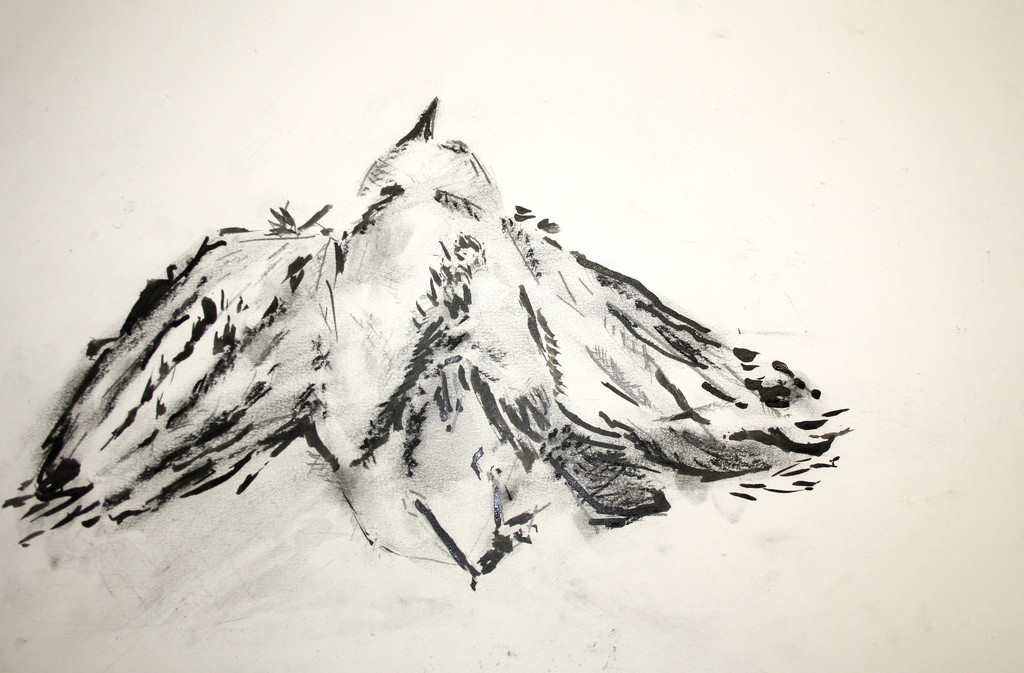Photo by Sophia.
I’ve been having an insightful shuffle through Mihaly Csikszentmihalyi’s book Creativity: The Work and Lives of 91 Eminent People. Mihaly is a seminal professor of Psychology and Management, and is the Founding Co-Director of the Quality of Life Research Center at Claremont. He writes:
“I have devoted 30 years of research to how creative people live and work, to make more understandable the mysterious process by which they come up with new ideas and new things. If I had to express in one word what makes their personalities different from others, it’s complexity. They show tendencies of thought and action that in most people are segregated. They contain contradictory extremes; instead of being an individual, each of them is a multitude.”
Nine out of the ten people in me strongly agree with that statement. As someone paid to be creative, I sometimes feel kaleidoscopic in my views or opinions, and that “multitude” of expressions sometimes confuses those around me. Why does that happen? My thoughts make cohesive sense to me, yet others sometimes feel that I am contradicting myself or switching positions. What is wrong with me?
Mihaly describes 9 contradictory traits that are frequently present in creative people:
01
Most creative people have a great deal of physical energy, but are often quiet and at rest. They can work long hours at great concentration.
02
Most creative people tend to be smart and naive at the same time. “It involves fluency, or the ability to generate a great quantity of ideas; flexibility, or the ability to switch from one perspective to another; and originality in picking unusual associations of ideas. These are the dimensions of thinking that most creativity tests measure, and that most creativity workshops try to enhance.”
03
Most creative people combine both playfulness and productivity, which can sometimes mean both responsibility and irresponsibility. “Despite the carefree air that many creative people affect, most of them work late into the night and persist when less driven individuals would not.” Usually this perseverance occurs at the expense of other responsibilities, or other people.
04
Most creative people alternate fluently between imagination and fantasy, and a rooted sense of reality. In both art and science, movement forward involves a leap of imagination, a leap into a world that is different from our present. Interestingly, this visionary imagination works in conjunction with a hyperawareness of reality. Attention to real details allows a creative person to imagine ways to improve them.
05
Most creative people tend to be both introverted and extroverted. Many people tend toward one extreme or the other, but highly creative people are a balance of both simultaneously.
06
Most creative people are genuinely humble and display a strong sense of pride at the same time.
07
Most creative people are both rebellious and conservative. “It is impossible to be creative without having first internalized an area of culture. So it’s difficult to see how a person can be creative without being both traditional and conservative and at the same time rebellious and iconoclastic.”
08
Most creative people are very passionate about their work, but remain extremely objective about it as well. They are able to admit when something they have made is not very good.
09
Most creative people’s openness and sensitivity exposes them to a large amount of suffering and pain, but joy and life in the midst of that suffering. “Perhaps the most important quality, the one that is most consistently present in all creative individuals, is the ability to enjoy the process of creation for its own sake. Without this trait, poets would give up striving for perfection and would write commercial jingles, economists would work for banks where they would earn at least twice as much as they do at universities, and physicists would stop doing basic research and join industrial laboratories where the conditions are better and the expectations more predictable.”
Sometimes what appears to be a contradiction on the surface is actually a harmony in disguise. My problem has been primarily one of communication. I am learning to let people know what I am thinking and why, and explaining myself in a way that helps them understand why I am discussing multiple perspectives instead of just cleanly stating my own. At first it might not make sense, but give me/us long enough, and it will.


This Damn true, sometimes I feel like why are we all like this. Even though I’m 100% good with me. I love this Mathew. Thanks for believing and accepting us.
I really liked the article. I’m a creative and the psychological insights are a little comforting. Sometimes I feel like I’m losing my mind because af the fluid stream of ideas, and being able to hold dual perspectives.
I have recently partnered with a firm in Johannesburg that has really helped me to understand how I communicate with myself and others. It’s an online assessment called Communication Intelligence, and it creates a profile on your communication styles and behaviors. You can check out the assessment on my website for free at blackwellandco.com/Communication Intelligence.
Peace. & Thanks!
S. Blackwell
As a creative, it’s was too long a read so I only read the first two lines of each description and now in typing gibberish when I should be finishing a the lyrics to my last eat song….oh.
Oh my, being creative has no direct connection to commercial productivity. Those definitions don’t define me. Although creatives may contribute to commerce in very productive ways. They are so much more. Humans are creative, and we create amazing hives, amazing tools, amazing ideas, and even amazing problems.
Referring to Ross: Creative (Noun)
1. Someone who generates new ideas and sales materials for marketing a product
2. Materials produced for marketing or advertising
People in the comments who use the terms like ‘impossible’ are most stupid of all. Something opposed to binary is possible. You just admit you don’t know it.
This article makes a lot of sense. I have been struggling recently with my job, and how my boss and co-workers perceive me and misunderstand me. My boss, I feel like, is not a creative type, and I don’t think she truly understands people like me, based on some comments she has made over time…. such as…
•”if you are an introvert, you will always be an introvert.”… This I feel is completely untrue. I feel like both. I come across as introverted, and I do need down time and sometimes it can take a little while to open up to certain people, but my enjoyment of being social and being in my element with like-minded people is incredibly satisfying to me. And the idea that someone will always be an introvert assumes that it may be hard-coded and unchangeable. In my opinion, my introvert tendencies are much more a product of my upbringing and something that can be changed with lots of work.
And I feel like I am very articulate and logical, and just as easily I can also garble what I am saying because I have a hard time putting into words the abstract and flowing ideas I have in my head. My boss gives me these sideways looks quite a bit… and then I start stumbling over my words even more because she looks at me like I am crazy.
And to those who I am not close to, I have always been hard to read. I have struggled with why people misunderstand me. In my head I have always felt rebellious and maybe wayyy too snarky, while on the outside can seem very mellow and reserved. My thoughts tend to be very different than how I come across to people who don’t know me well.
I feel like pretty much every point Matthew says is true to who I am.
blah blah. We creatives don’t care what you think of us. At least, I don’t. :-p
Very good article and
Very good article and many of us tend to work on freelance projects that foster lots of intense focus and sometimes unusual sleeping and waking patterns. Also it has been interesting being surrounded by business people recently who are definitely oriented with narrower perspectives. I sense they are confused by me and in turn some of the perspectives I hear are extremely narrow. Maybe it is a question of big picture vs. details but it is not really that. We tend to want to explore the world and they shy away from investigating outside their field. We are encouraged to be curious about the world and our place in it.
Problem is: creatives need jobs, too!